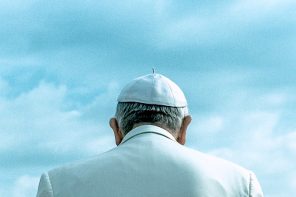Let’s say you’re a prominent climate change denier. And then Pope Francis comes along and announces that climate change is going to be a major item on his agenda for the coming months. What do you do?
Do you:
(A) Hold a press conference in Rome and tell the Church it has no business meddling in science;
(B) Accuse Pope Francis of being misled by charlatan UN experts; or
(C) Liken climate-deniers to Galileo, as part of a long line of truth-tellers who have been marginalized by the moralizing authority of the Catholic Church.
The answer is (D) All of the above.
These were some of the strategies recently adopted by two prominent climate denial groups, the Cornwall Alliance and the Heartland Institute. In a joint press conference in Rome earlier this week, speakers for the groups condemned the Pope for bungling the science, overstepping his role as a spiritual leader, and hurting the world’s poor.
“Humans are not causing a climate crisis on God’s Green Earth,” said Heartland Institute President Joseph Bast in a recent press release, “in fact, they are fulfilling their Biblical duty to protect and use it for the benefit of humanity.
Their concern about the Vatican is understandable. Francis has more than a billion Catholics in his flock (including two of the top three contenders for the Republican presidential nomination). The Vatican is pivoting toward the climate: it held a summit on climate change this week, and Francis will release a major encyclical on the environment this summer. A few weeks later, he’ll travel to the United States, the planet’s biggest carbon emitter.
And as climate change advocates go, Pope Francis is particularly difficult to impugn. Deniers can accuse liberal politicians of attempting to expand government regulation, and argue that scientists have a vested interest in keeping funds flowing to their labs.
But with the pope, even these flimsy conflict-of-interest claims fall apart. Pope Francis is an intelligent, morally engaged person with no material incentive to address climate change, who seems to have consulted the evidence and deduced that there’s a need for response.
Which perhaps is why one skeptic, perhaps feeling desperate, went so far as to put Francis in league with the Roman Inquisition. According to the National Catholic Reporter:
One speaker, comparing the subject to the 17th century trial by the church of Galileo Galilei, said the pope would demean his office if he put his moral authority behind those fighting climate change.
The Cornwall Alliance and the Heartland Institute aren’t the modern day heirs to Galileo. For one thing, Pope Francis is not Pope Urban VIII, a Florentine nobleman who believes that the earth is the center of the cosmos. And Galileo wasn’t backed by major corporations with a financial stake in overthrowing geocentrism.
The Vatican speakers, on the other hand, arrived at their objective analyses with the help of powerful corporate backers. The Heartland Institute gets money from quite a few corporate players who stand to lose money from climate regulations, most notably industrial billionaire Charles Koch. Meanwhile, the Cornwall Alliance has been entangled with a fundraising organization that gets support from ExxonMobil, Chevron, and a family foundation linked to Gulf Oil.
Religious groups can’t dictate scientific findings, but they can respond to them. Perhaps one of Heartland’s keynote speakers in Rome, Catholic British hereditary peer Christopher Monckton, should have taken a note from Margaret Thatcher. Citing the risk of the greenhouse effect, the British prime minister told the United Nations in 1989:
We need our reason to teach us today that we are not, that we must not try to be, the lords of all we survey.
We are not the lords, we are the Lord’s creatures, the trustees of this planet, charged today with preserving life itself—preserving life with all its mystery and all its wonder.
May we all be equal to that task.




